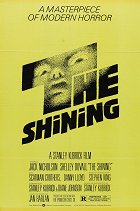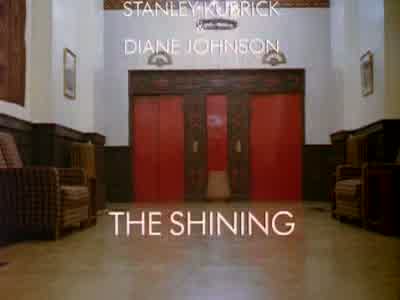Directed by:
Stanley KubrickCinematography:
John AlcottCast:
Jack Nicholson, Shelley Duvall, Danny Lloyd, Scatman Crothers, Barry Nelson, Philip Stone, Joe Turkel, Anne Jackson, Tony Burton, Lia Beldam, Vivian Kubrick (more)VOD (5)
Plots(1)
Frustrated writer Jack Torrance takes a job as the winter caretaker at the ominous, mountain-locked Overlook Hotel so that he can write in peace. When he arrives there with his wife and son, they learn that the previous caretaker had gone mad. Slowly Jack becomes possessed by the evil, demonic presence in the hotel. (official distributor synopsis)
Videos (1)
Reviews (14)
I may be strange, but I tried to read King's book three times, and I always put it down about 100 pages. I didn't like it. But the film immediately got to me through its suggestive atmosphere of creeping terror, in which Jack Nicholson's masterful performance plays a big part. He plays Jack Torrance like a harp, first quietly with all the dark undertones, and then suddenly he starts to yank on all the strings. Jack's transformation into a monster is gradual, and he's basically "making" this film. Kubrick admirably managed to create fear without darkness and cramped spaces. The fear of The Shining is an airy, light, spacious fear... And that's absolutely unique. The film also feels authentic because the evil seems to have no source – is it "from inside" Jack, or is it evil embodied in the genius loci? Is Jack's madness really just the work of his bruised psyche? The viewer is stuck in the same uncertainty as the main heroes of the film - it is difficult to determine the distribution of forces between reality and the supernatural. But everything only leads to one thing... REDRUM... did it also give you goose bumps?
()
The excellent minimalist soundtrack couldn't be better, and some scenes, especially the bathroom scene and the boy's vision of dismembered children in the hotel corridor, are truly horrifying, but I still have some reservations. Jack Nicholson, as excellent as he is, overacts disgustingly in some scenes; if that's the director's intention, I didn't quite get it. And Shelley Duvall, as she runs around the hotel with a knife in her hand, tries to play scared, but you can see in her face that she's not very good at it. But these are just tiny blemishes on the beauty of the whole.
()
For Kubrick, this wasn’t about making a standard horror movie with causally plotted fantastical elements. On the contrary, he presents to viewers a devastating metaphor for a pathological toxic relationship resembling and shrouded in the classic forms of the genre. Of course this adaptation irritated Stephen King, since he had drawn the story in his novel (and in a number of others) from his own demons, or rather from his own essence. He unsurprisingly wanted Jack Torrance, as his alter ego, to gain the reader’s sympathy due to the fact that Jack suffers and struggles with those demons. In this case, such an “inner demons” comparison is fundamentally meaningful in its inherent buck-passing. And that is where King and Kubrick differ. Whereas the author has the protagonist struggle with the external forces of evil, Kubrick seemingly uses the supernatural elements as a metaphor for the personalities of the characters and the dynamics of their relationship. The motif of stifling chauvinism and a toxic yet outwardly orderly relationship in The Shining is also wonderfully incorporated into Kubrick’s characteristic image compositions. While the frequently heard mythology of the great directors requires highlighting filmmakers working with a widescreen format, Kubrick preferred the 1.66:1 format starting with A Clockwork Orange. On the one hand, he was led to that by his desire to protect his compositions from lateral cuts in video releases, but mainly the narrower screen in combination with the right lens enabled him to create aesthetically imposing symmetrical compositions centred in the middle of the screen. In The Shining, the perfectly framed images in combination with the precise production design and the tense acting of the central couple create their own unnaturalness and the omnipresence of an almost terrifyingly oppressive atmosphere, which brings out the inner tension from behind the tidy façade. Over the course of the narrative, the camerawork maintains an identical approach; only the characters’ façade gradually crumbles. Kubrick thus expresses that the rising madness is not coming from the outside, but rather that it has always been present on the inside. After all, the film’s most unsettling moments include one of the first scenes, when Wendy is speaking with the doctor and unconsciously reveals more about the dynamics of her relationship with Jack than she would have wanted.
()
Redrum. Redrum. Redrum. The main asset of this movie is neither Nicholson, nor Kubrick’s precise directing, but the flawless atmosphere in the mountain top hotel. Kubrick’s loose adaptation of King’s novel is attractive due to it being actually only very loosely based on the motifs in one of King’s best stories and is not a mere idealess “one to one" adaptation (however much I may think that Torrance’s fall was far too sudden in comparison with the gradual descent in the book). redruM!
()
A classic of the horror genre that hasn't aged and is an example of the director's creative approach to the literary source material. Kubrick had an exceptional talent for creating impressive visuals and working with actors, which, in combination with the screenplay, created a disturbing work with an atmosphere that is rarely seen in the genre today. Scenes such as the wildly moving toy car on the red carpet or the chase in the garden maze are etched in my memory forever. This was one of Jack Nicholson's best roles, perfectly portraying the gradual breakdown of the main character's personality. His loss of self-confidence as the family provider is gradually replaced by increasingly aggressive dominance, culminating in a horrifying finale. The final camera shot of the framed photograph on the wall is a clever touch that will please horror fans. The scenery of the monumental hotel complex set in an isolated mountain environment also plays an irreplaceable role. Overall impression: 95%. Interestingly, the author of the book, Stephen King, was not completely satisfied with the tone of this film, despite it being one of the best adaptations of his work. It seems that he was disappointed that he did not receive his usual minor role.
()



Ads